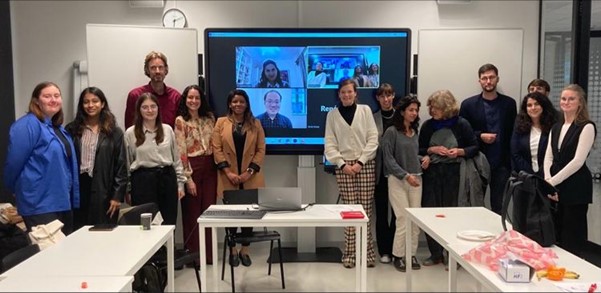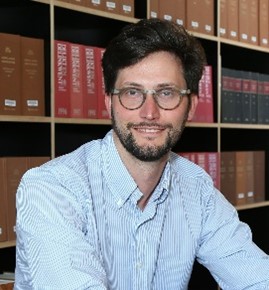
Credits: picture taken by the authors
By Leonie Reins, Alberto Quintavalla and Candice Foot
Introduction
The relationships between human rights and natural resources are often complex and multi-faceted. This is an especially timely discussion demonstrated by the ongoing erosion of planetary boundaries and increasing calls for sustainable development. In recognition of these complexities, the one-day Workshop on Human Rights and Natural Resources, held on 12 October 2023, stimulated discussion with a view to having a more holistic approach to the topic. The workshop was hosted by the Erasmus School of Law and was supported by the Netherlands Network for Human Rights Research and the small grants scheme of the research initiatives Rebalancing Public & Private Interests and Erasmus Center of Empirical Legal Studies. Against this backdrop, the workshop addressed topics related to the complexity of balancing the scarcity of natural resources, the accessibility of natural resources necessary for the realisation of human rights, and the societal imperative to ensure the protection of both.
The day started off with a warm welcome and introduction from the organising committee, Leonie Reins (Erasmus University Rotterdam), Alberto Quintavalla (Erasmus University Rotterdam) and Candice Foot (Erasmus University Rotterdam), who welcomed speakers from around the world to Rotterdam.
Panel One
The first panel of the day included four presentations. Otto Spijkers (Erasmus University Rotterdam) and Luísa Netto (Leiden University) kicked off the day with their presentation on ‘Human Rights Based Climate Litigation against the Fossil Fuel Industry in the Netherlands (Shell, KLM)’, where they discussed three case studies wherein domestic courts of the Netherlands produced pioneering judgements relating to climate change. They noted that these cases were instituted by foundations (Milieudefensie, Fossielvrij, Urgenda) acting in the common interest – purporting to represent the rights and interests of both present and future generations – and discussed various important legal, philosophical and moral questions in this regard. Next up Elisabetta Marzo (Università del Salento), presented on ‘The Human-Rights Approach to the Sustainable Use of Land: Promoting the Right to Development through the Affirmation of the Rights of Local Communities’, which provided an overview of the human rights-based approach to land governance in the international legal framework. She demonstrated that the human-rights approach to the management of land changed perspectives over time, moving from a top-down approach that originated in the permanent sovereignty over natural resources and the right to development, to a bottom-up approach grounded in three elements of rights-holders, the human right to land and the role of corporations. This was followed by the presentation of Ji Ma (Duke University School of Law) entitled ‘Targeting Multinational Corporations’ Human Rights Harms in Exploiting Natural Resources: The Privatization of Soft International Law’, which explored the specific mechanisms and prospects of applying soft international law against Multinational Cooperations in domestic courts. The final presentation in the first panel was by Mahima Balaji (Jindal Global Law School) on ‘Considering the ‘Development’ Potential of the Property Rights Regime in Response to Environmental Problems’, which discussed how the usage of property rights could be conducive to a greater environmental protection. Specifically, the discussion revolved around the constitutional right to property in selected domestic legislation, the ‘human right’ to property, tort-claims, market-based mechanisms such as emission trading schemes, and indigenous communities’ land rights.
Panel Two
After four engaging presentations from the first panel a welcome coffee break fuelled the energy and interests for the second panel. This second panel began with a presentation from Carolin Heinzel (Universität Leipzig) entitled ‘A Human Rights Based Approach to Biodiversity Loss in the Multilevel System’ where she demonstrated that biodiversity constitutes one of the planetary boundaries that has already been exceeded, and noted that the current responses of the multilevel legal system are inadequate at protecting biodiversity. She offered a human rights-based approach, drawing from climate litigation, the potential right to a healthy environment and a special focus on vulnerable groups, to inform this approach. This was followed with a presentation on ‘The Role of a Right to a Healthy Environment in Environmental Protection’ by Renée Knoop (Erasmus University Rotterdam). Her presentation focused on the added value that a right to a healthy environment, as recently declared at international level, may play for addressing environmental degradation. The last presentation for the second panel was by Alba Perez Victorio (Dublin City University) and Edoardo Celeste (Dublin City University) who presented their research on ‘The “new” Right to Sustainable Digital Products and Services.’ They commented on the EU Declaration on Digital Rights and Principles for the Digital Decade by focusing on whether there could be a right to sustainable digital products and services.
Panel Three
These presentations were followed by a second opportunity for caffeination and leg stretching before the third and final panel began. The third panel began with a presentation by Fabíola Azevedo (Nordic Master Program in Environmental Law) on ‘Intersectionality of Hydropower Development: A Renewable Energy Solution for Economic Growth in the Global South’, which investigated whether ensuring the participation of affected communities and incorporating their perspectives in decision-making processes can contribute to successful governance in the context of hydropower in Brazil. Following from this, and also on the topic of hydropower development, Alice Lopes Fabris and Nadia Belaïdi (CNRS – Muséum National d’Histoire Naturelle (Paris) gave a presentation on ‘Unveiling the Impacts of the Belo Monte Hydroelectric Power Plant: Human Rights and the Destruction of the Environment.’ The presentation used the example of the Belo Monte Plant to shed light on the complexities and implications of projects marked as ‘green initiatives’ and emphasised how such undertakings can have detrimental effects on the environment and human rights. The final presentation of the day was given by Tara Janvier-Olsen (Lund University) on ‘Human Rights and Natural Resources Management: the ICJ’s Opportunity to Promote an Earth System Approach,’ which analysed the request of Vanuatu for an advisory opinion on climate change by the ICJ from an Earth System Law perspective.
Concluding Remarks
After a full day of presentations, questions and lively discussions, the participants had the unique opportunity to travel on one of Rotterdam’s famed Water Taxis, taking them to a dinner where budding conversations and ideas were continued. On the success of the workshop, the organising committee had some final comments. Candice Foot noted that “The existence of complicated and multi-faceted relationships between human rights and natural resources is not new, from this workshop alone we saw how these issues span the globe. The presentations clearly demonstrated that natural resources are at the foundation of multiple human rights, and that the preservation of one is integral to the protection of the other. We also saw how passionate scholars are facing these challenge head on and working towards ensuring the protection of both”.
Bios

Candice Foot is PhD Candidate at the Erasmus Graduate School of Law of Erasmus University Rotterdam. She works in the interdisciplinary research initiative Public & Private Interests, which explores the role of private actors in safeguarding public interests. She is also a member of Human Rights Here Editorial Board. Her research interests include the intersections between corporate responsibilities, environmental law, human rights, and everything water related!

Leonie Reins is Professor for Public Law and Sustainability at Erasmus School of Law. Prior to joining ESL she worked as an Assistant Professor at the Tilburg Institute for Law, Technology and Society (TILT) at Tilburg University. She obtained her FWO-financed PhD on "the coherent regulation on energy and environment - using shale gas as a case study" from KU Leuven, where she subsequently also worked as a Post-Doctoral Researcher. In addition Leonie worked as Legal Advisor at a Brussels-based environmental law and policy consultancy, where she was involved in projects on environmental, energy and climate change law and policy. Leonie holds and LL.M. in International, European and Comparative Energy and Environmental Law

Alberto Quintavalla is Assistant Professor of Innovation in Public Law at the Erasmus School of Law of Erasmus University Rotterdam and Associated Fellow of the Centre of Digital Governance. He has been a visiting researcher at the Hebrew University of Jerusalem and the European University Institute. His research interests are at the intersection of environmental governance, human rights, and digital technologies.